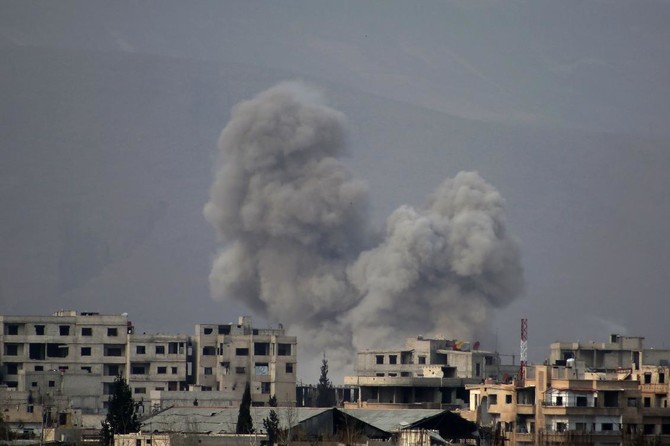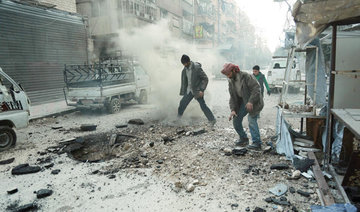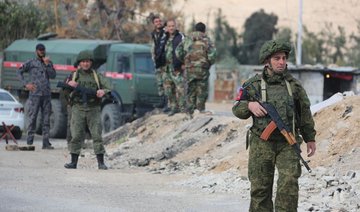DOUMA: Syrian regime forces continued their offensive against Eastern Ghouta Sunday, a day after they cut off the rebel-held enclave’s largest town, pressing on with a 20-day assault that has left more than 1,000 civilians dead.
Government troops and allied militia launched their military campaign for Eastern Ghouta on February 18 and have since overrun more than half of the area, defying global calls for a halt to the violence.
The assault has followed a divide-and-conquer strategy, eating away at rebel-held territory, and government forces on Saturday successfully isolated Ghouta’s main town of Douma in a blow for the beleaguered rebels.
Regime fighters cut off a road linking Douma with the town of Harasta further west and also captured the town of Misraba, according to the Syrian Observatory for Human Rights.
“Regime forces have therefore divided Eastern Ghouta into three parts — Douma and its surroundings, Harasta in the west, and the rest of the towns further south,” the Britain-based monitor said.
Shelling and air strikes slammed into Douma on Saturday, trapping residents inside their basements for hours, AFP’s correspondents in the town said.
Rescue workers and medics were struggling to navigate the town’s rubble-littered roads to bring wounded residents back to field clinics.
At least 20 civilians — including four children — were killed in Douma on Saturday, in addition to 17 civilians in other battlefront towns, said the Observatory.
The deaths raised the assault’s total toll to 1,031 civilians, including 219 children, according to the Observatory. More than 4,350 have been wounded.
Douma’s opposition-run local council issued an urgent “distress call” on Saturday to international organizations.
“The bomb shelters and basements are full, and people are sleeping in the streets and in public gardens,” the statement said.
“For three days, it has been hard to bury the dead because of the intense bombing on the cemetery,” it added.
Eastern Ghouta is the last remaining opposition-controlled zone on the outskirts of the capital, and rebels there have regularly fired rockets onto Damascus.
On Saturday, at least one child was killed and four other civilians wounded in rebel shelling on eastern districts of Damascus, according to state news agency SANA.
Rebels have tried to slow the advance with an attempted counter-offensive, but President Bashar Assad’s forces steamrolled their efforts.
Syrian state television broadcast live footage from Misraba hours after it was captured by the army on Saturday, showing dozens of civilians in a dark basement, surrounded by troops.
One elderly man broke down into tears as he relayed how his family had fled to Douma under fierce bombardment.
Eastern Ghouta is home to around 400,000 people, living under a five-year siege that has made food and medical aid exceedingly rare.
On Friday, an aid convoy by the International Committee of the Red Cross, the United Nations and the Syrian Arab Red Crescent delivered food to hunger-stricken residents.
It was the second convoy in one week, after deliveries on Monday were interrupted by heavy bombardment.
The UN refugee agency’s Syria representative, who entered Ghouta with Monday’s convoy, said the area was “on the verge of a major disaster.”
“I’ve never seen such scared faces in my life,” Sajjad Malik said Friday.
He described seeing a five-story building that had been reduced to rubble, with a powerful stench emanating from several bodies trapped underneath.
Two Islamist groups are the most prominent rebel factions in Ghouta, but jihadists from Hayat Tahrir Al-Sham (HTS) — once linked to Al-Qaeda’s Syria branch — also have a presence.
On Friday, 13 HTS members and their relatives were bussed out of the enclave.
Rebels said they would be taken to HTS territory in the northern province of Idlib, in an arrangement struck following consultations with the UN and international players.
Such evacuation deals have been repeatedly agreed in Syria’s seven-year war, most notably in the second city of Aleppo in late 2016.
After a ferocious month-long government assault, thousands of rebel fighters and civilians were bussed out of the city’s east.
That paved the way for Syria’s government to announce the full recapture of Aleppo — the largest defeat to date for the fractured opposition movement.
Syria’s conflict erupted with protests against Assad but has since developed into a full-blown war drawing in world powers.
Russia has intervened on Assad’s behalf while Turkey has backed rebels against his regime.
Saturday, Ankara-backed rebels advanced against Kurdish militia in northwest Syria, coming to within two kilometers (just over one mile) of the flashpoint town of Afrin, the Observatory said.
Elsewhere in Syria, the White Helmets rescue force suffered its first female fatality on Saturday, after air strikes hit a rebel-held town in Idlib province.
Syria army cuts off main rebel town in Ghouta as death toll tops 1,000
Syria army cuts off main rebel town in Ghouta as death toll tops 1,000

Death toll in Iran protests over 3,000, rights group says

- The protests erupted on December 28 over economic hardship and swelled into widespread demonstrations calling for the end of clerical rule
- President Donald Trump, who had threatened ‘very strong action’ if Iran executed protesters, said Tehran’s leaders had called off mass hangings
DUBAI: More than 3,000 people have died in Iran’s nationwide protests, rights activists said on Saturday, while a “very slight rise” in Internet activity was reported in the country after an eight-day blackout.
The US-based HRANA group said it had verified 3,090 deaths, including 2,885 protesters, after residents said the crackdown appeared to have broadly quelled protests for now and state media reported more arrests.
The capital Tehran has been comparatively quiet for four days, said several residents reached by Reuters. Drones were flying over the city, but there were no signs of major protests on Thursday or Friday, said the residents, who asked not to be identified for their safety.
A resident of a northern city on the Caspian Sea said the streets there also appeared calm.
The protests erupted on December 28 over economic hardship and swelled into widespread demonstrations calling for the end of clerical rule in the Islamic Republic, culminating in mass violence late last week. According to opposition groups and an Iranian official, more than 2,000 people were killed in the worst domestic unrest since Iran’s 1979 Islamic Revolution.
“Metrics show a very slight rise in Internet connectivity in #Iran this morning” after 200 hours of shutdown, the Internet monitoring group NetBlocks posted on X. Connectivity remained around 2 percent of ordinary levels, it said.
A few Iranians overseas said on social media that they had been able to message users living inside Iran early on Saturday.
US President Donald Trump, who had threatened “very strong action” if Iran executed protesters, said Tehran’s leaders had called off mass hangings.
“I greatly respect the fact that all scheduled hangings, which were to take place yesterday (Over 800 of them), have been canceled by the leadership of Iran. Thank you!” he posted on social media.
Iran had not announced plans for such executions or said it had canceled them.
Indian students and pilgrims returning from Iran said they were largely confined to their accommodations while in the country, unable to communicate with their families back home.
“We only heard stories of violent protests, and one man jumped in front of our car holding a burning baton, shouting something in the local language, with anger visible in his eyes,” said Z Syeda, a third-year medical student at a university in Tehran.
India’s External Affairs Ministry said on Friday that commercial flights were available and that New Delhi would take steps to secure the safety and welfare of Indian nationals.











